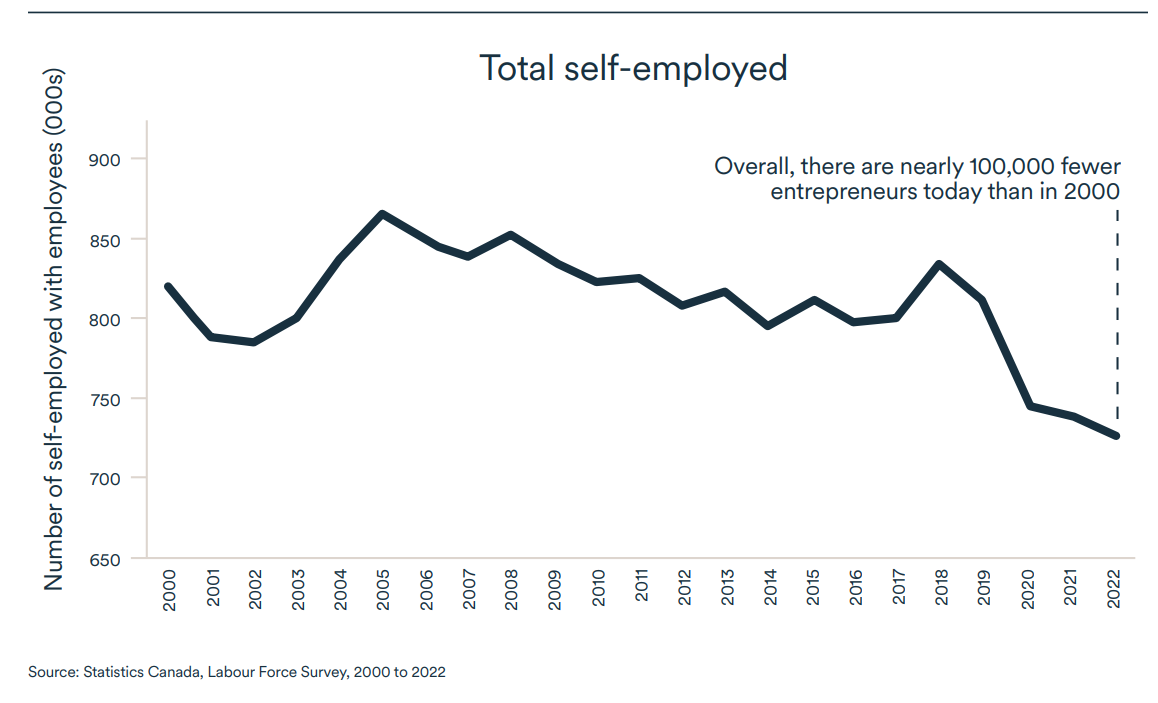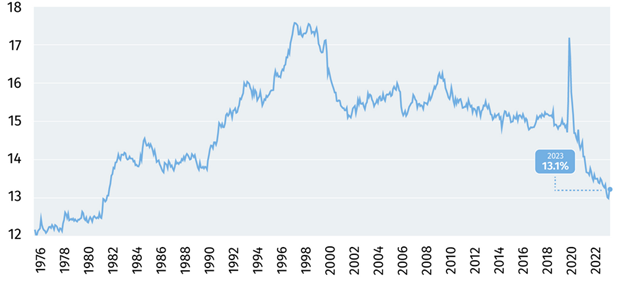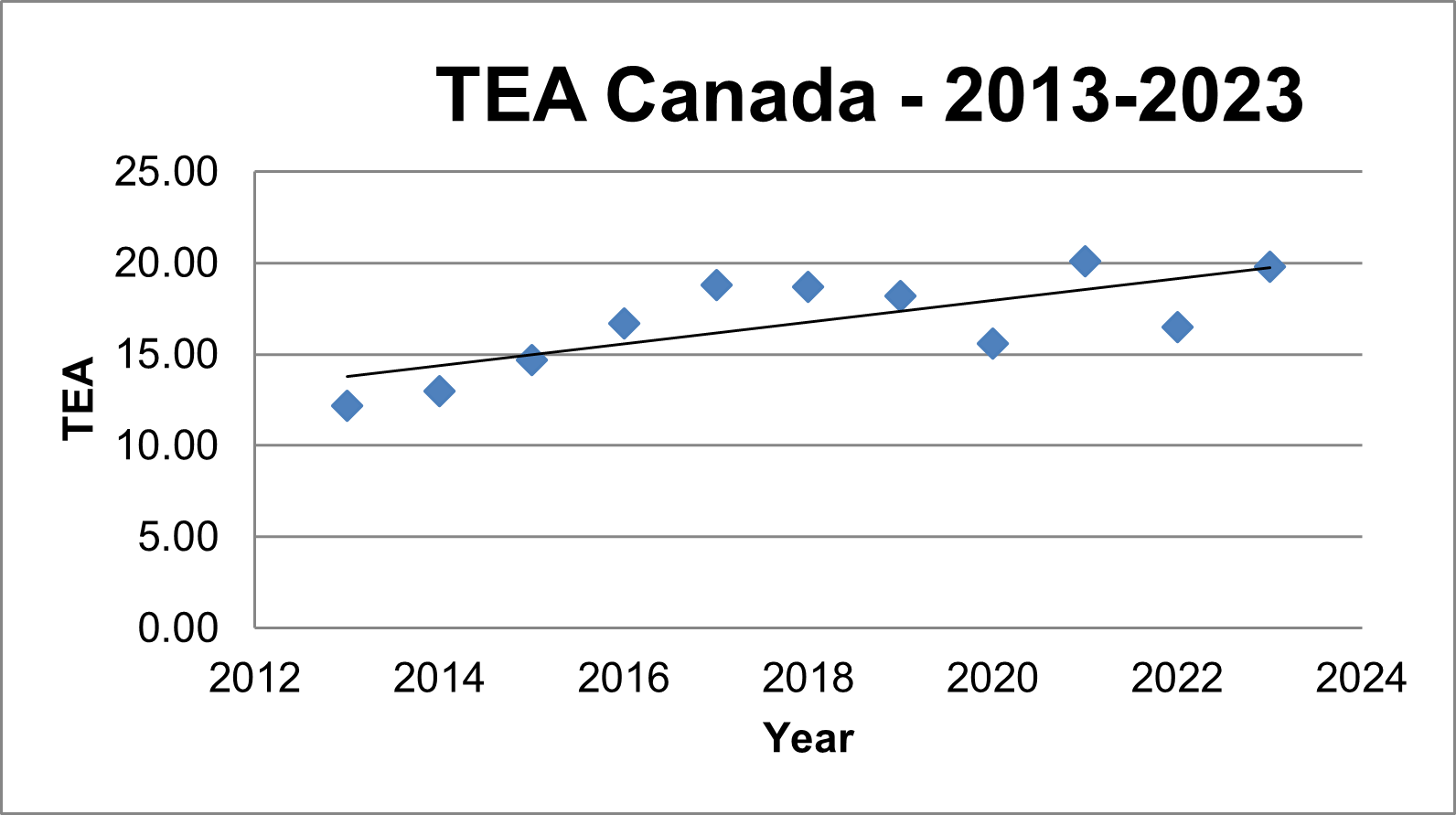The future of entrepreneurship in Canada
 Peter Josty is Executive Director of the Centre for Innovation Studies in Calgary.
Peter Josty is Executive Director of the Centre for Innovation Studies in Calgary.
It is well understood that entrepreneurship is a sign of a dynamic economy.
Entrepreneurs are often the people who commercialize new technologies, for example Edison with the electric light bulb, Steve Jobs with the Apple computer and iPhone, and Elon Musk with Tesla electric vehicles.
So, signs that entrepreneurship may be declining are a cause for concern.
A report from the Business Development Bank shows that Canada, despite having a much larger population now, has 100,000 fewer entrepreneurs with employees than 20 years ago. (See graph below).

The reasons for the decline, according to the report, are:
- An aging population means the pool of potential entrepreneurs in their late 20s to 40s is declining.
- A strong labour market means it is easier to get a job.
- A more complex business environment means it is harder for small businesses to compete.
By international comparison, OECD data shows that Canada is in the middle of the pack when comparing self-employed with employees as a percentage of employment, at 5.2 per cent. This compares with 1.9 per cent for Japan, 2.8 per cent for the U.K., 3.2 per cent for the U.S., 7.2 per cent for Italy, and 7.4 per cent for Switzerland.
Another report, from the Royal Bank, shows a similar decline in the seasonally adjusted self-employment since 2000. (See graph below).

Source: Royal Bank
The report points out that 13 per cent of Canadian workers are self-employed, but only 4 per cent have employees as of 2022, and that the self-employed earn only 59 per cent as much as employees of companies.
However, a brighter picture emerges from the Global Entrepreneurship Monitor studies, which shows a steady increase in the last decade of the fraction of the adult population actively involved in starting a business, the total early-stage entrepreneurship (TEA). (See graph below).

Source: Global Entrepreneurship Monitor
Future of Canadian small businesses is uncertain
The Canadian Federation of Independent Business reports that 76 per cent of small business owners are planning to exit their businesses in the next decade, most of them by retirement.
Most don’t have a succession plan, and it is questionable if there will be enough buyers for these businesses, given the decline in interest in running a small business. This could lead to a further reduction in small businesses.
A longer-term perspective comes from The Economist, which examined the behaviour of Generation Z – those born between 1997 and 2012. This generation is much richer than baby boomers or millennials at a similar age, and The Economist suggests this means they are less likely to be interested in entrepreneurship as they can earn more money and achieve work life balance better by working in a large company.
A report from Randstad echoes this view. It says that Generation Z is cautious about taking risks and job security is a top priority.
Is there a silver lining?
Is the decline in the number of Canadian businesses a bad thing?
One consideration is that large businesses are more productive than small businesses. For example, in 2022 large companies (those with more than 500 employees) employed 36 per cent of the private workforce but produced 45 per cent of the GDP.
Given Canada’s serious productivity problem, a decline in the number of small businesses may give productivity a small boost.
Will immigration help? According to research from the Global Entrepreneurship Monitor, first-generation immigrants were slightly more likely to start a business than the general Canadian population. However, second-generation immigrants – whose parents moved to Canada – were significantly less likely to be entrepreneurs.
Conclusion
- More Canadians are trying to start a business, but fewer are successful in establishing an ongoing business.
- Canada is in the middle of the pack among OECD countries in number of self-employed with employees per million population.
- Generation Z may be less likely to want to start a business, so it is possible we are at the start of a long-term decline in entrepreneurship. Time will tell if that is true.
- The decline in the number of small businesses in Canada may have a silver lining that it may improve Canada’s dismal productivity record. This is because overall small businesses are less productive than large businesses.
- The retirement of many small business owners presents an opportunity for those wanting to acquire a business, but this could be disruptive if there aren’t enough buyers.
Events For Leaders in
Science, Tech, Innovation, and Policy
Discuss and learn from those in the know at our virtual and in-person events.
See Upcoming Events
You have 0 free articles remaining.
Don't miss out - start your free trial today.
Start your FREE trial Already a member? Log in
By using this website, you agree to our use of cookies. We use cookies to provide you with a great experience and to help our website run effectively in accordance with our Privacy Policy and Terms of Service.





